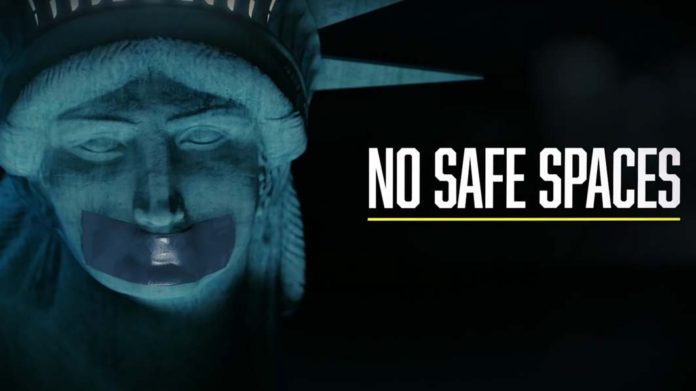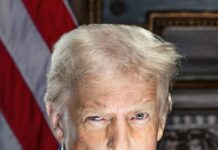“Anybody who comes to speak to you and you disagree with, you should have an argument with them, but you shouldn’t silence them by saying you can’t come because I’m too sensitive to hear what you have to say.”
– (President Barack Obama, September 2015)
American students today face a lamentable reality, the reality that the first amendment right to free speech and assembly has been eroded from college campuses across the country. To spark discussion on the grave danger our generation faces, The Roundup’s Senior Staff will take a position on several arguments presented by No Safe Spaces, a political documentary in which commentator Dennis Prager and comedian Adam Carolla discuss free speech, and the lack thereof, on college campuses.
“All speech should be protected, even hate speech.”
One key point that both Dennis Prager and Adam Carolla made throughout the documentary is the power that dialogue between people has. Dennis Prager stated that even as a Jew, he believes that Nazis should have the right to display their swastikas and talk about their terrible beliefs. He said this not because he wants to condone the act but because he has faith that in our civilized society, people will confront that speech and discredit it. He warms against what many call for, which is censorship and silencing of this type of “hate speech” because Prager would argue that it just allows for that same incongruent way of thinking to build in the dark.
Instead, he believes that the public itself will diminish the extent of the speech because it will have been dismantled through both rational thought and also clarity, which illustrates the absurdity of the belief.
While I see the rationale behind this approach to essentially let society work out what is allowable speech, I think that there is a whimsical factor which is what the public believes. What if, for say, the Neo-Nazis start spouting their beliefs in public and instead of the public challenging and discrediting these beliefs, they instead become complacent with it because of the repeated presence of it is normalized? If people are inherently flawed, is there not the possibility that something might slip through the societal filter, affirming what hate speech is? In my opinion, this approach assumes that people always act rationally and objectively, ready to confront and ostracize inappropriate speech–all in the interest of the common good.
More Flaws
Also, another way in which Prager’s approach to absolute free speech is flawed is that it is unnecessary and requires unneeded work. Ever since World War II, the world has acknowledged that being a Nazi or following Naziism is terrible and is unjustifiable. Germany’s ban on advocating for the Nazis or praising the Nazis does not in any way make society worse.
The speech the country is prohibiting is that which would be struck down by community anyway were it spoken. And would it not be more efficient and productive to have laws in place to prevent something that society would have to correct otherwise? In essence, I think some of these clear-cut restrictions on universally inappropriate language saves society the hassle of having to deal with it and allows society to focus on discussing more important topics such as socioeconomic and political issues. Take heinous speech such as the N-word, for example. With its historical connotation, there is no reason for the word to be used in any circumstance other than strictly for historical education when it is used in a primary source.
So then why would someone object to having restrictions put in place on the word in casual conversation? There is no need for it, and the simple use of it in simple conversation will be met with backlash and hostility anyway.
“They have to believe we are evil; otherwise they’d have to debate us.”
No Safe Spaces criticizes the academic left for not only shutting down conservative voices on college campuses but also trying to destroy them personally by classifying their opposition under unmerited labels, like racist, bigoted, or fascist. The intolerance and suppression of opposing views undermines free speech and the discussion that should be taking place at institutions of higher learning.
The movie warrants their claim by examining several instances where conservative voices were uninvited from speaking at different college campuses. The movie specifically highlighted an incident at the California State University, Northridge. Carolla and Prager were removed from speaking on campus because “’people higher up the food chain’ at CSUN weren’t happy about the “content” of the planned presentation.” (Hollywood Reporter)
As former President Obama suggested at an education town hall in 2015, silencing a group’s voice on campus helps none, instead restricting the intellectual growth that comes from engaging in open dialogue with divergent pools of thought. A large portion of young adults of voting age in the United States cannot defend their political views because they’ve never been challenged to consider the other side of the argument.
The alarming reality exposed by the documentary is that there has been little public discussion on the topic of free speech on college campuses. This issue has been buried by the media, but it threatens the freedom of speech so essential to the American identity. The fact that The Roundup editors feel compelled to write this article under the label of “Senior Roundup Editors” highlights how pervasive this issue has become.
Other Notes
From a film standpoint, the documentary engaged the attention of The Roundup Senior staff for its entire 95 minutes. At times, it gave the impression that the film was a promo for Dennis Prager. However, the film primarily provided specific evidence to substantiate their central argument that the restriction of free speech on college campuses poses an imminent threat. Prager and Carolla interviewed people who have experienced the consequences of suppressed speech first hand from both the left and right, particularly emphasizing liberal figureheads speaking to the dangers of ostracizing the right in the classroom.
Stay tuned to The Roundup for more political commentaries!






